Chickens can eat cantaloupe skin and seeds, as long as it is done in moderation. However, too much cantaloupe can cause diarrhea or other health problems due to its high water and sugar content, so it should be fed in moderation.
Table of Contents
Nutritional Benefits Of Cantaloupe For Chickens
Feeding cantaloupe skin and seeds to chickens is safe and beneficial as it contains vitamins A, C, and B, providing them with a nutritious treat. However, it is important to feed it in moderation as excessive consumption can cause diarrhea.
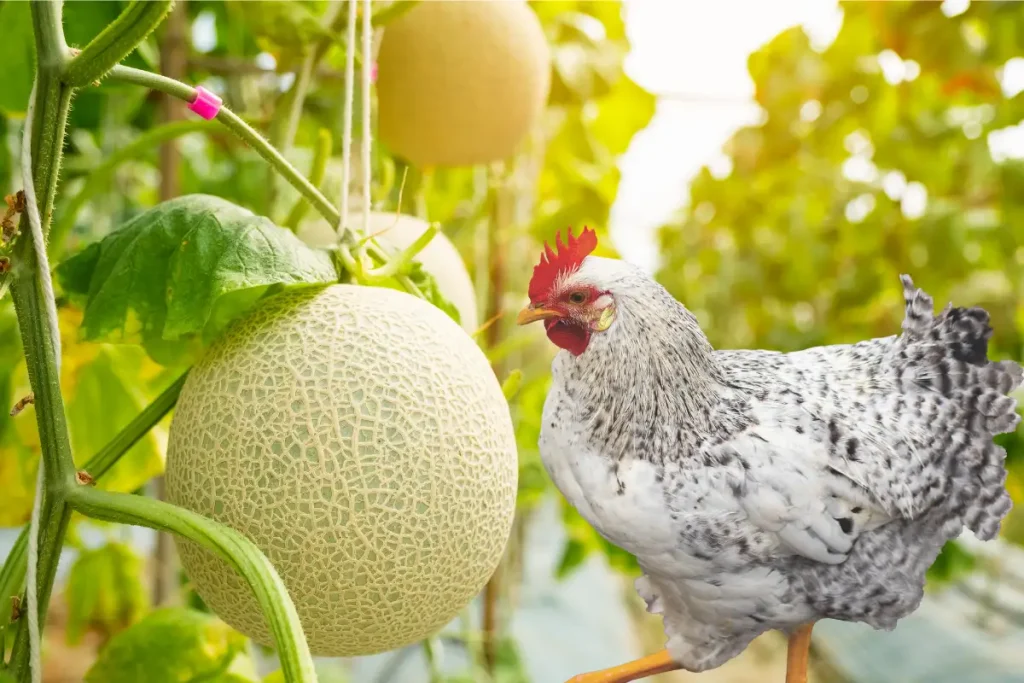
High In Vitamins A & C
Cantaloupe is a delicious and nutritious treat for your chickens. It is packed with essential vitamins that contribute to their overall health and well-being. One of the standout vitamins in cantaloupe is vitamin A, which plays a crucial role in maintaining healthy vision, promoting proper growth, and supporting a strong immune system. Additionally, cantaloupe contains a good amount of vitamin C, which is known for its antioxidant properties and ability to boost the immune system.
Provides B Vitamins
In addition to vitamins A and C, cantaloupe is also a great source of B vitamins. These vitamins are essential for energy production, promoting a healthy metabolism, and supporting the proper functioning of the nervous system. B vitamins are particularly important for chickens, as they help to regulate their appetite and digestion, ensuring that they can effectively convert their food into energy.
Edible Cantaloupe Seeds
Contrary to popular belief, cantaloupe seeds are not only safe for chickens to eat, but they are also highly nutritious. These seeds are packed with essential nutrients, including protein and healthy fats, which are necessary for maintaining strong muscles and promoting overall growth. The stringy bits attached to the seeds are also a great source of fiber, which aids in digestion and promotes a healthy digestive system. So, don’t hesitate to share the entire cantaloupe with your chickens, including the seeds!

Credit: gilmoresinc.com
Potential Risks And Considerations
When it comes to feeding cantaloupe skin and seeds to chickens, it’s important to remember that moderation is key. While cantaloupe is a nutritious and tasty treat for chickens, overfeeding it can lead to potential health problems.
Due to its high water and sugar content, feeding too much cantaloupe to chickens can increase the risk of diarrhea or other digestive issues. It’s essential to feed cantaloupe in moderation and as part of a well-balanced diet that includes proteins, grains, vegetables, and other fruits.
Avoid feeding the skin if it has been treated with pesticides
If you decide to feed cantaloupe skin to your chickens, it is crucial to ensure that the skin has not been treated with pesticides. Pesticides can be harmful to chickens and may pose risks to their health. Always opt for organic or pesticide-free cantaloupes to ensure the safety of your flock.
| Potential Risks and Considerations: |
|---|
| Moderation is key |
| Risk of diarrhea |
| Avoid feeding the skin if it has been treated with pesticides |
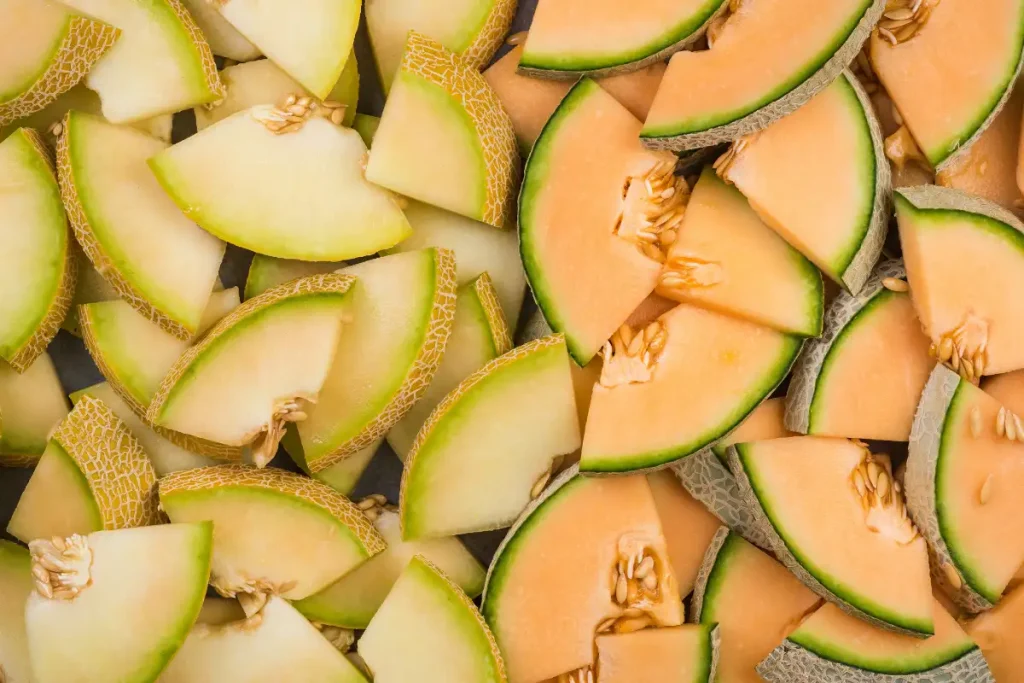
How To Prepare And Feed Cantaloupe To Chickens
Chickens require a balanced diet that includes a mix of proteins, grains, vegetables, and fruits to thrive. Cantaloupe, with its sweet and juicy flesh, can be a delicious and nutritious addition to their diet. However, it is important to know how to properly prepare and feed cantaloupe to chickens to ensure their health and well-being.
Washing And Cutting The Cantaloupe
Before feeding cantaloupe to your chickens, it is essential to wash the fruit thoroughly. This removes any dirt, bacteria, or pesticides that may be present on the skin. To wash the cantaloupe:
- Fill a clean sink or large bowl with water.
- Place the cantaloupe in the water and gently scrub the skin with a brush.
- Rinse the cantaloupe under running water to ensure all dirt and residue are removed.
- Once the cantaloupe is clean, cut it in half with a sharp knife.
- Use a spoon to scoop out the seeds and discard them, as they can be a choking hazard for chickens.
- Now, the cantaloupe is ready to be served to your chickens!
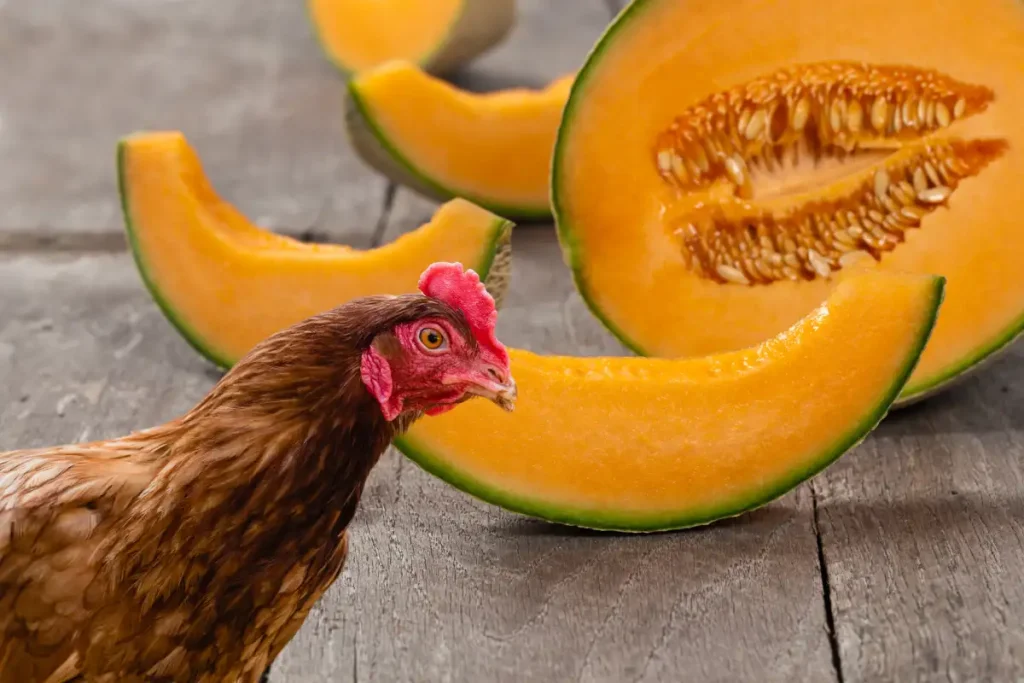
Feeding Fresh Or Dehydrated Cantaloupe
There are two ways to feed cantaloupe to your chickens: fresh or dehydrated.
1. Fresh cantaloupe:
If you choose to feed fresh cantaloupe to your chickens, simply cut the fruit into small, bite-sized pieces. This allows your chickens to easily consume the fruit without any difficulty. Additionally, fresh cantaloupe provides hydration to your chickens due to its high water content, especially during hot summer months.
2. Dehydrated cantaloupe:
If you prefer to feed dehydrated cantaloupe to your chickens, you can do so by following these steps:
| Instructions: | Benefits: |
|---|---|
| Slice the cantaloupe into thin, uniform pieces. | Convenient storage and longer shelf life. |
| Place the slices on a dehydrator tray. | Retains nutritional value and intensifies the flavor. |
| Set the dehydrator to a low temperature, around 135°F (57°C). | Preserves nutrients and enzymes. |
| Allow the cantaloupe slices to dehydrate for 8-10 hours. | Makes the cantaloupe more suitable for long-term storage. |
| Once the slices are completely dry and crispy, remove them from the dehydrator. | Easy to handle and serve as a treat. |
| Store the dehydrated cantaloupe in an airtight container. | Extended shelf life, allowing you to provide treats to your chickens throughout the year. |
Incorporating Cantaloupe Into Their Regular Feed
To provide your chickens with the benefits of cantaloupe on a regular basis, you can incorporate it into their regular feed:
- Finely chop or mash the cantaloupe and mix it with their usual grain or pellets.
- Ensure that the cantaloupe pieces are well-distributed throughout the feed.
- Monitor your chickens’ intake and adjust the amount accordingly to prevent overfeeding.
- Remember to provide a balanced diet by incorporating other fruits, vegetables, and protein sources into their feed.
By following these simple guidelines, you can safely and effectively introduce cantaloupe into your chickens’ diet. Whether you choose to feed fresh pieces, dehydrated treats, or incorporate it into their regular feed, your chickens will surely enjoy the sweet and juicy goodness of cantaloupe while reaping its nutritional benefits.
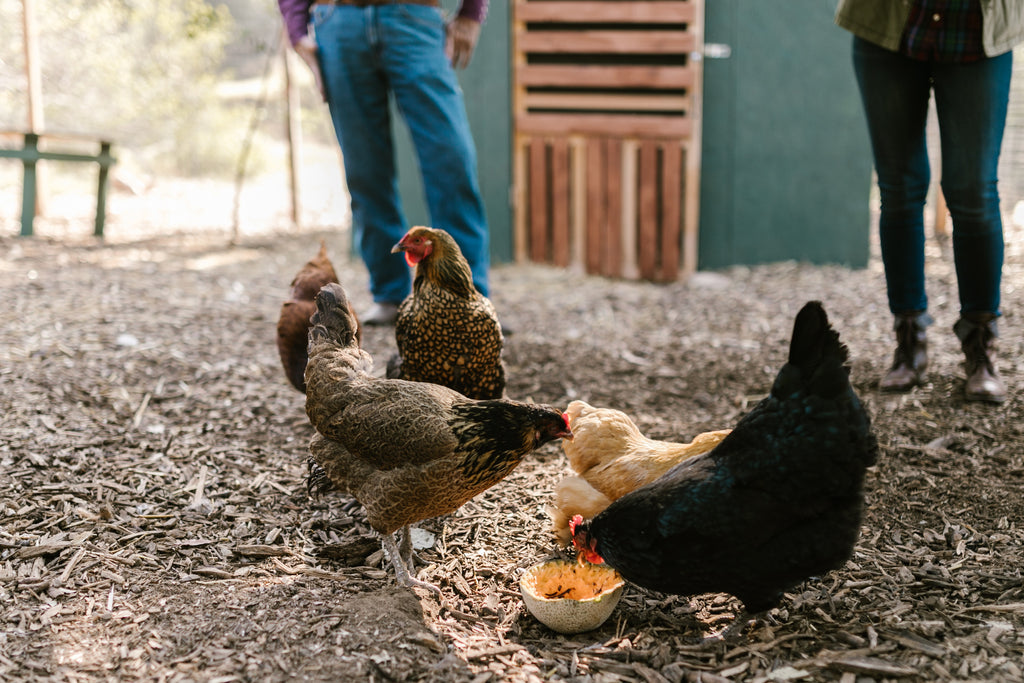
Credit: grubblyfarms.com
Other Fruits And Vegetables Suitable For Chickens
Chickens can eat cantaloupe skin and seeds. While the flesh of the cantaloupe is more nutritious, the skin and seeds are safe for chickens to consume. Just make sure to feed them in moderation due to the high water and sugar content.
Watermelon
Watermelon is another fruit that chickens can enjoy. They can eat the entire watermelon, including the rind and seeds. While the flesh of the watermelon is more nutritious, containing vitamins B and C, the rind is perfectly safe for chickens to consume. It may not provide as many nutrients, but it makes for a satisfying treat. Just make sure to remove any harmful seeds, such as those from hybrid watermelons, before feeding them to your chickens.
Cucumber
Cucumbers are a refreshing and hydrating treat for chickens. They can eat both the peel and the flesh, as well as the seeds. Cucumbers are low in calories and rich in water, making them a great choice to keep your chickens hydrated during hot summer months. Just be sure to wash the cucumbers thoroughly before offering them to your feathered friends.
Apple
Apples are a popular snack for chickens, providing them with essential vitamins and minerals. Both the peel and flesh of the apple are safe for chickens to consume, but avoid feeding them the seeds. Apple seeds contain cyanide, which can be harmful to chickens if eaten in large quantities. To prevent the risk of choking, it’s best to cut the apples into small pieces before giving them to your chickens.
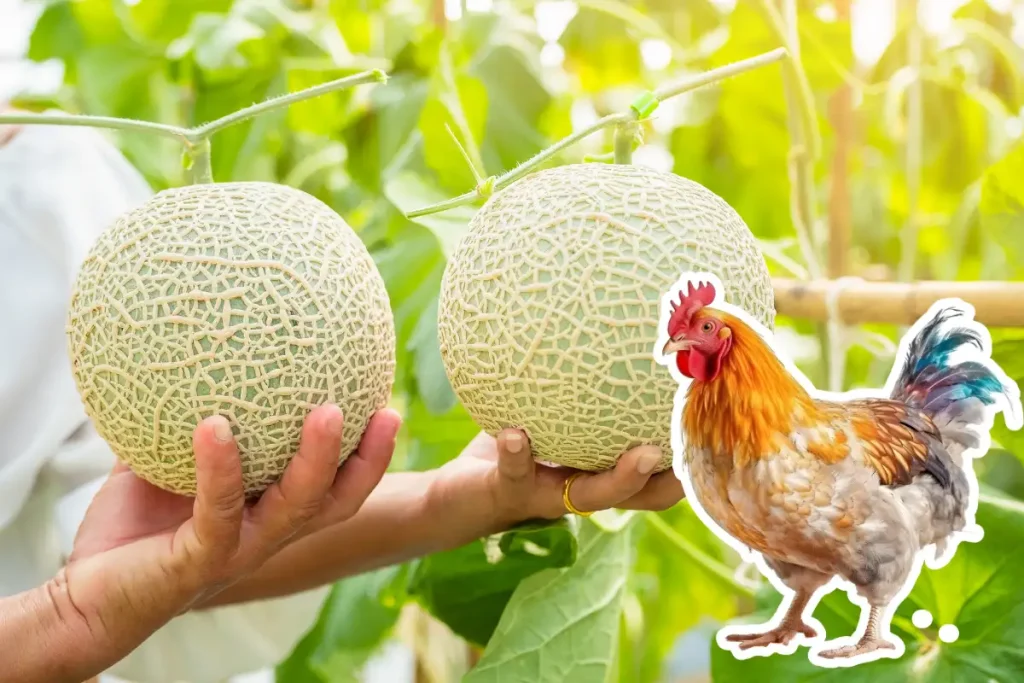
Other Recommended Options
In addition to watermelon, cucumber, and apple, there are several other fruits and vegetables that are suitable for chickens to eat. Here are a few more options to consider:
Remember to always introduce new foods to your chickens gradually and in moderation. By providing a varied diet of fruits and vegetables, you can ensure that your chickens are receiving a well-rounded and nutritious diet to keep them happy and healthy.
Foods To Avoid Feeding Chickens
Chickens can eat cantaloupe skin and seeds in moderation, as long as they are raw and free from any harmful chemicals. However, it’s important to note that too much cantaloupe can cause digestive issues, so it’s best to feed it to them in small amounts.
Toxic Foods
Feeding chickens a balanced diet is essential for their overall health and well-being. However, there are certain foods that can be toxic to chickens and should be avoided. One such category of foods includes those that contain cyanide, such as apple seeds and stone fruit pits. Cyanide can be harmful to chickens and cause a range of health problems. It is important to remove apple seeds and stone fruit pits before offering these fruits to your poultry.
Dangers Of Raw Meat And Eggs
Feeding chickens raw meat and eggs may sound convenient, but it can pose serious health risks to your flock. Raw meat can introduce harmful bacteria, such as Salmonella, into their system, leading to infections and digestive issues. Similarly, raw eggs can carry bacteria like E. coli, which can also cause illnesses in chickens. To ensure the health and safety of your birds, it is best to cook any meat or eggs before feeding them to your chickens.
In conclusion, while chickens can enjoy a variety of fruits and vegetables, it is important to be cautious about the foods you offer them. Avoid feeding your chickens toxic foods like apple seeds and stone fruit pits, and always cook any meat or eggs before serving them to your flock. By providing a safe and balanced diet, you can ensure the health and happiness of your chickens.
Frequently Asked Questions On Can Chickens Eat Cantaloupe Skin And Seeds
Can Chickens Eat Melon Rinds?
Yes, chickens can eat melon rinds. The rind is safe for them to consume, although it may not be as nutrient-rich as the flesh. Melon rinds do contain some vitamins B and C. Feed melon rinds to chickens in moderation as part of their balanced diet.
Can 5 Week Old Chickens Eat Cantaloupe?
Yes, 5-week-old chickens can eat cantaloupe. However, it should be fed in moderation due to its high water and sugar content, which can cause diarrhea and health problems. The rind and seeds are safe for chickens to consume.
What Seeds Can Chickens Not Eat?
Chickens can eat most seeds, but they should not eat stone fruit pits or apple seeds as they contain cyanide. Additionally, they should not be fed avocado pits and skins, fruit pits and seeds, rhubarb & rhubarb leaf, onion & garlic, raw potatoes and peels.
Feed cantaloupe seeds and rind in moderation.
What Can’t Chickens Eat For Scraps?
Chickens can’t eat bread, raw meat, raw eggs, avocado pits and skins, fruit pits and seeds, rhubarb and rhubarb leaf, onion and garlic, and raw potatoes and peels.
Conclusion
Chickens can safely eat cantaloupe skin and seeds, providing they are given in moderation. While the flesh of the cantaloupe is more nutritious, the skin and seeds contain some important vitamins like B and C. It is important to remember that too much cantaloupe can cause digestive issues for chickens, so it should be fed in moderation.
Overall, including a variety of fruits and vegetables in a chicken’s diet can contribute to a balanced and healthy diet.

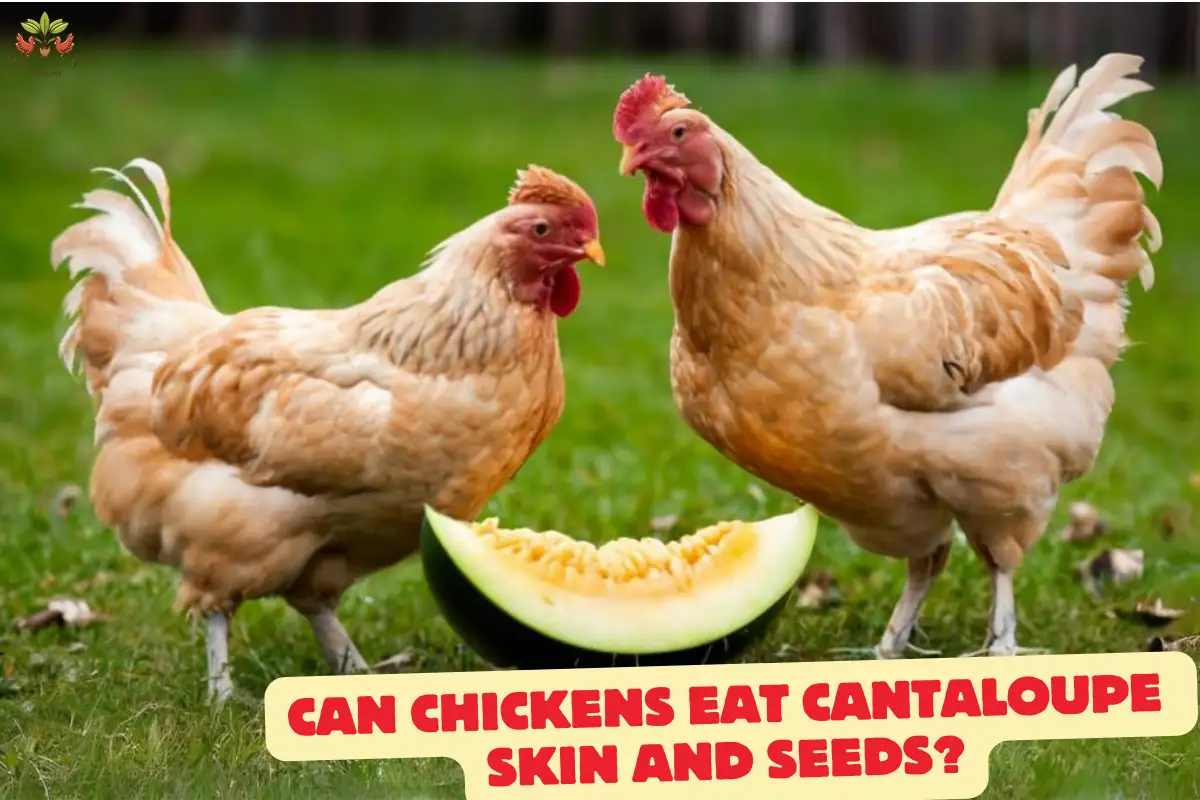
![Terrifying Trend: Why Do Roosters Chase Humans? [2024]](https://plantsandchickens.com/wp-content/uploads/2024/02/why-do-roosters-chase-humans-4.webp)


Leave a Reply